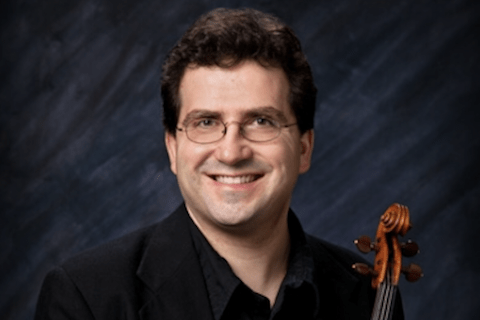The life of a professional classical musician, on the road year-round pursuing a performance career, can be daunting, to say nothing about the hassles of living out of luggage for weeks at a time. Many superior musicians with families chose the stability of teaching careers, with secondary performing careers when they can fit it in.
Sunday evening at the Sandra G. Powell Recital Hall at UT’s Natalie L. Haslam Music Center, UT associate professor of violin, Dr. Miroslav Hristov, brought together four other superior musicians who have chosen teaching careers for first-rate performances of music by Russian composer Reinhold Glière, German composer Ludwig Van Beethoven and Austrian composer Franz Schubert, all masters of string chamber music.
Hristov, who performed as assistant concertmaster with the Knoxville Symphony for several years, could, without doubt, have a sterling solo career, as could all of the others. He has performed and recorded widely, in addition to presenting his research on Eastern European pedagogical methods for violin at conferences around the world.
Joining him were violinist Dr. Yu-Fang Chen, assistant professor of violin at Ball State University; cellist Daniel Veis, professor of cello and head of string performance at the Academy of Performing Arts in Prague, Czech Republic; violist Dr. David Kováč, assistant professor of violin and viola at East Tennessee State University; and cellist Dr. Sean Hawthorne, new to the string faculty at ETSU.

Cellist Dr. Sean Hawthorne, violist Dr. David Kováč, violinist Dr. Yu-Fand Chen, violinist Dr. Miroslav Hristov and cellist Dr. Daniel Veis
Five of Gliére’s “8 Pieces for Violin and Cello”, Op. 39, were played by Hristov and Veis to open the concert. Built around 19th Century dance forms of various styles and moods, the opening “Prelude” was brooding. The “Gavotte” showed more enthusiasm, especially with Hristov’s double stopping, the skill of playing two notes simultaneously. The “Berceuse” was charming and romantic, with its song-like structure and the concluding “Scherzo,” a light-hearted, sometimes comic and often frenetic composition form, bounced all over the place with its mood shifts.
Next, Chen, Kováč and Hawthorne played the “G Major Trio” from Beethoven’s second set of trios, “String Trios,” Op. 9. The opening “Adagio” movement was gorgeously played and the concluding “Presto” sped along.
But it was a dazzling performance of Franz Schubert’s “String Quintet in C Major,” D. 956, performed by Hristov and all four of his guests, that made this a wonderful concert. The playing was richly and carefully detailed, with both drama and restraint. The second movement “Adagio” with its plucked cello strings, is as exquisite as anything in classical music. The “Scherzo” marched relentlessly with forward motion and the bright, dancing “Allegretto” was pure joy.
This concert was free and every bit as good as big-ticket programs. Most of the concerts at the School of Music are free. Admittedly, it can sometimes be a challenge to find parking if there is a sports event also going on. But otherwise, it was a shame so few community people took advantage of this opportunity to be surrounded by great music.
For everyone with limited budgets, these concerts are opportunities to get out of the house and enjoy great music beautifully performed. A full calendar of the school’s concerts is available at https://music.utk.edu.

